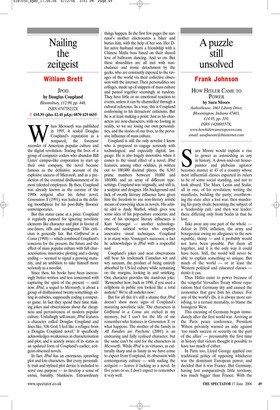Nailing the zeitgeist
William Brett
JPOD by Douglas Coupland Bloomsbury, £12.99, pp. 448, ISBN 074758222X ✆ £10.39 (plus £2.45 p&p) 0870 429 6655 When Microserfs was published in 1995, it sealed Douglas Coupland’s reputation as a nonpareil, the foremost recorder of American popular culture and the digital revolution. Tracing the lives of a group of computer coders who abandon Bill Gates’ campus-like corporation to start up their own company, the novel became famous as the definitive account of the explosive success of Microsoft, and as a prediction of the eventual disillusionment of its most talented employees. By then, Coupland was already known as the curator of the 1990s zeitgeist after his debut novel, Generation X (1991), was hailed as the defining mouthpiece for his post-Baby Boomer contemporaries.
But this status came at a price. Coupland is regularly panned for ignoring novelistic elements like character and plot in favour of one-liners, riffs and neologisms. This criticism is generally fair. But Girlfriend in a Coma (1998) — which combined Coupland’s concerns for the present, the future and the effect of mass popular culture with full characterisation, innovative plotting and a daring ending — seemed to signal a growing maturity, and an ambition to take himself more seriously as a novelist.
Since then, his books have been increasingly better written and less concerned with capturing the spirit of the present — until now. JPod, a sequel to Microserfs, is about a group of disillusioned twenty-somethings sitting in cubicles, supposedly coding a computer game. In fact they spend their time making jokes and observations about the cheapness and pervasiveness of modern popular culture. Unfailingly self-aware, JPod features a character called Douglas Coupland and lines like, ‘Oh God, I feel like a refugee from a Douglas Coupland novel.’ It specifically acknowledges weaknesses in characterisation and plot, and is acutely aware of its status as an updated form of Coupland’s earlier, zeitgeist-obsessed novels.
In fact, JPod has an enormous, sprawling plot and lots characters. But every personality trait and stylised plot device is included to serve one purpose — to develop a sense of ennui, banality, blankness. Extraordinary things happen. In the first few pages the narrator’s mother electrocutes a biker and buries him, with the help of her son. Her Dlist actor husband starts a friendship with a Chinese Mafia boss based on their shared love of ballroom dancing. And so on. But these absurdities are all met with nonchalance and ironic detachment by the geeks, who are constantly exposed to the ravages of the world via their collective obsession with the internet. Their personalities are collages, made up of snippets of mass culture and pasted together seemingly at random. They have little or no emotional reaction to events, unless it can be channelled through a cultural reference. In a way, this is Coupland conforming to his detractors’ criticisms. But he is at least making a point. Just as his characters are non-characters, with no footing in reality, so we are losing our own personalities, and the stories of our lives, to the pervasive influence of mass culture.
Coupland is still the only novelist I know who is prepared to engage seriously with technological, and especially digital, language. He is also hugely innovative when it comes to the visual effect of a novel. JPod features, among other oddities, pi written out to 100,000 decimal places, the 8,363 prime numbers between 10,000 and 100,000, and an array of different typesettings. Coupland was originally, and still is, a sculptor and designer. His background and lack of overtly literary influence have given him the freedom to use non-literary artistic means of conveying ideas in novels. His artistic idol is Andy Warhol, which gives you some idea of his pop-culture concerns, and one of his strongest literary influences is Kurt Vonnegut — another technologyobsessed, satirical writer who employs innovative visual techniques. Coupland is in many ways Vonnegut’s successor, a fact he acknowledges in JPod with a respectful nod.
Coupland’s jokes and neat observations still bear his trademark Canadian wit and wry sarcasm, the product of being entirely absorbed by US-led culture while remaining on the margins, looking in and smirking. One character provides the stand-out joke: ‘Remember how, back in 1990, if you used a cellphone in public you looked like a total asshole? We’re all assholes now.’ But for all this it’s still a shame that JPod doesn’t show more signs of Coupland’s maturing novelistic side. The characters in Girlfriend in a Coma are etched in my memory, but I can’t for the life of me remember who features in Generation X, or what happens. The mother of the family in All Families are Psychotic (2001) is an endearing and fully realised character, but the same can’t be said for the characters in Microserfs. While JPod is as virtuoso, as culturally sharp and as funny as we have come to expect from Coupland, its obsession with contemporary culture — with nailing the zeitgeist — leaves it lacking as a novel. In five years or so, I don’t expect to remember it very well.


















































































 Previous page
Previous page